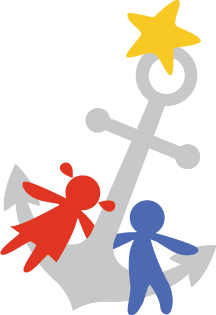Care Beyond Imagination
IT'S THE PROCESS, NOT THE PRODUCT

Care Beyond Imagination
IT'S THE PROCESS, NOT THE PRODUCT
HOW WE ARE ALIKE...
Three Similarities That We Both Agree On...
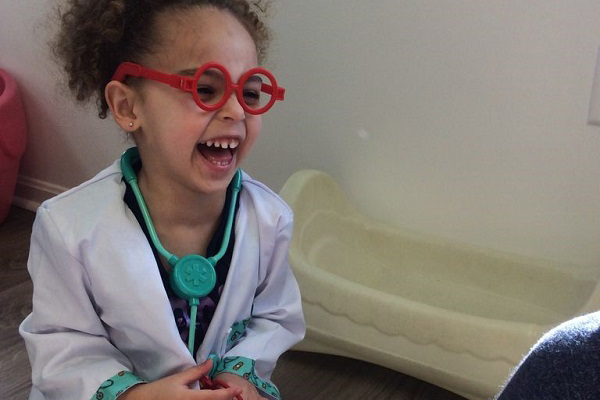
Every Child Develops At His Or Her Own Rate
The first few years of life are truly remarkable. Although children usually follow a sequence mastering one skill before they acquire another, children naturally develop at their own rate.
“It’s The Process, Not The Product”
It’s the experience of painting, drawing, and cutting that matter most to your child’s development. For children, it’s easy to enjoy the process because they haven’t yet been conditioned to value product over process.

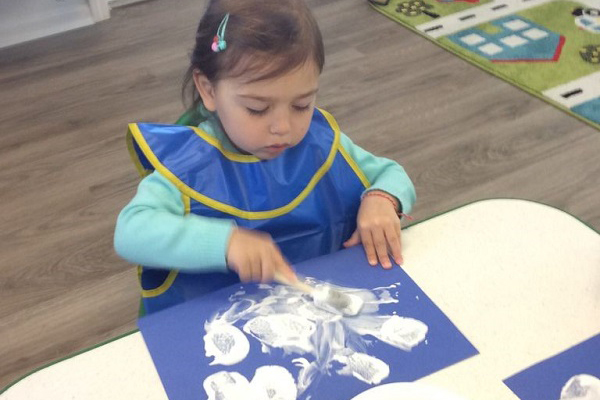
Children Construct Their Own Knowledge With Hands On Learning
We know children learn in many ways: visual, auditory, tactile, kinesthetic, and social. Still, there is no substitute for activities that require kids to use their hands as well as their minds.
The STAR Preschool Difference
THE TWO BIGGEST DIFFERENCES THAT SET US APART...
HOW MATERIALS ARE USED
We Teach Children To Think Outside The BOX
Montessori programs only use Montessori designed materials. Each piece in a Montessori classroom is designed for a single purpose. Montessori allows children opportunities to problem solve, but only within the boundaries of the materials provided.
STAR Preschools encourages children to use materials and toys in the classroom in new and different ways for multiple purposes. We want children to develop creativity and problem-solving skills. In fact, it is built into the curriculum. Teachers are encouraged to asked children: How else can this be used? How could we make this better? Is it reflective of our “Growing Up Green” concept? A core concept of environmental awareness is “reuse”. How can we effectively reuse materials that already exist? Our teachers give children opportunities to “think outside the box”, Montessori programs do not!

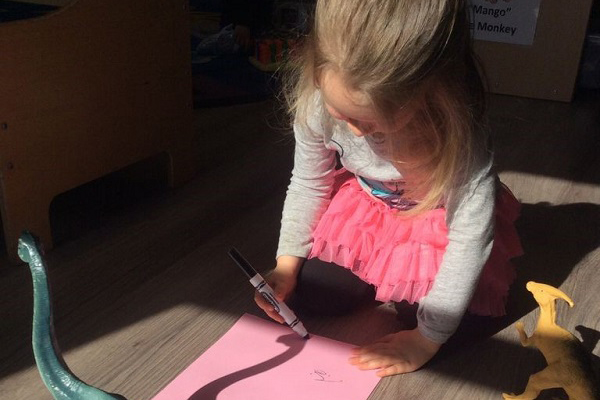
THE INCLUSION OF PRETEND PLAY
Promoting Pretend Play Creates CARE BEYOND IMAGINATION
The other major difference is the approach to imagination and pretend play. Montessori theory is based on “practical life” experiences. They do not support pretend play as a means of cognitive development.
At STAR Preschools we believe young children learn by imagining and doing. We have well-equipped dramatic play areas to support this belief. Watching your child pick up a stone and pretend it is a zooming car or hopping a Lego across the table as if it were a person or a bunny are both great example of how we engage imagination.
Pretending Builds Skills In Many Essential Developmental Areas Of Life
Research has shown that pretend play provides children with a microcosm for life that encourages them to take the skills they have learned in classroom lessons and apply them to meaningful life activities. This process of application helps your child not only develop a skill, but learn how to use it in everyday situations.

Why Play...
Three Developmentally Appropriate Practices
- Play Is An Important Vehicle For Children's Social, Emotional, And Cognitive Development, As Well As A Reflection Of Their Development
- Play Gives Children Opportunities To Understand The World, Interact With Others In Social Ways, Express And Control Emotions, And Develop Their Symbolic Capabilities
- Play Provides A Context For Children To Practice Newly Acquired Skills And Also To Function On The Edge Of Their Developing Capacities To Take On New Social Roles, Attempt Novel Or Challenging Tasks, And Solve Complex Problems That They Would Not (Or Could Not) Otherwise Do

Pretend Play Builds Social and Emotional Skills
Teaches Sharing, Empathy and Builds Self-Esteem
Engaging in pretend play allows children to actively experiment with the social and emotional roles of life. Through cooperative play they learn how to take turns, share responsibility, and creatively problem-solve. Pretending to be different characters helps teach the importance of empathy. Children naturally have an egocentric point of view, but through maturation and cooperative play, they will begin to understand the feelings of others. In addition, pretending to be anything they want to be also builds self-esteem!
Children Understand The Difference Between Fantasy And Reality
At a young age, children begin to understand the difference between fantasy and reality. Imaginative play and acting out both familiar and fictional characters help children internalize this important distinction and use this knowledge in future real-life situations.
Children are encouraged to engage in dramatic play activities in the dress up, block play and even outside on the playground. These creative opportunities help children to better understand the world and provide them with the much-needed outlet for their emotions. In addition, these experiences help children to develop a sense of individuality and respect for other’s work.
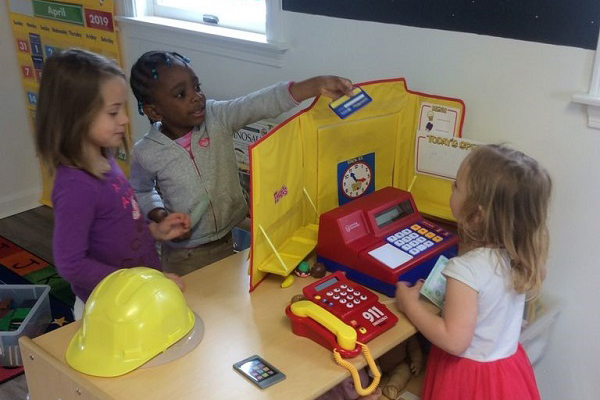

Pretend Play Builds Language Skills
Helps Your Child Understand The Power Of Language
Children love to engage in imaginary play with toys and friends. They often use words and phrases you never thought they knew! Many times, our own words are reflected in the play of children. Kids can do a perfect imitation of us! When a child realizes the power of language through pretend play with others, they learn that words give them means to re-enact a story or organize play. Making this connection between spoken and written language provides a skill that will later help them learn to read.
Builds Vocabulary
Children build vocabulary when they engage in pretend play. Introducing theme-specific words during play will quickly expand a child’s use of words. Often children like to pretend to do the things that adults do. Providing them with magazines, books, paper, and pencils as dramatic play props, offers pre-reading and pre-writing skills to mimic real-life situations.
Children are encouraged to engage in dramatic play activities in the dress up, block play and even outside on the playground. These creative opportunities help children to better understand the world and provide them with the much-needed outlet for their emotions. In addition, these experiences help children to develop a sense of individuality and respect for other’s work.
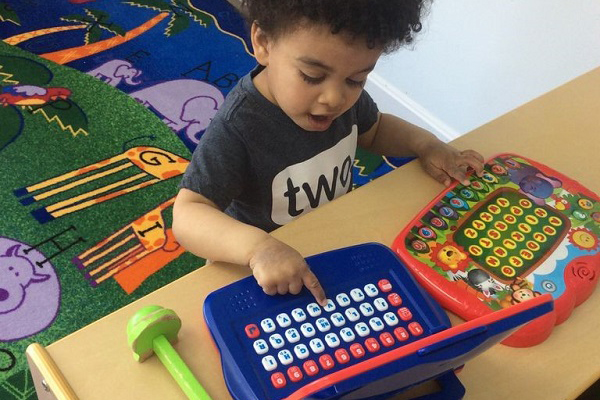
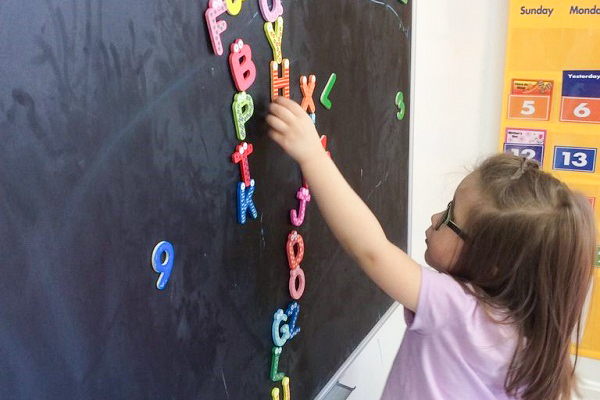
Pretend Play Builds Thinking Skills
Helps Solve Problems
Pretend play provides important cognitive thinking skills. Whether your child is role playing or searching for materials to build a pretend house, they are using a variety of problem-solving skills. This critical thinking will be used in every aspect of their future life.
Learn Self-Regulation Skills
Does your child like to roughhouse? Great! Many researchers believe that this sort of play helps develop the frontal lobe of the brain which regulates behavior. So, don’t worry about this type of activity encouraging your child to act out or become too aggressive. Rest assured that in monitored situations, rough-house play can help them learn the self-regulation skills to know when this type of play is appropriate.
Children are encouraged to engage in dramatic play activities in the dress up, block play and even outside on the playground. These creative opportunities help children to better understand the world and provide them with the much-needed outlet for their emotions. In addition, these experiences help children to develop a sense of individuality and respect for other’s work.
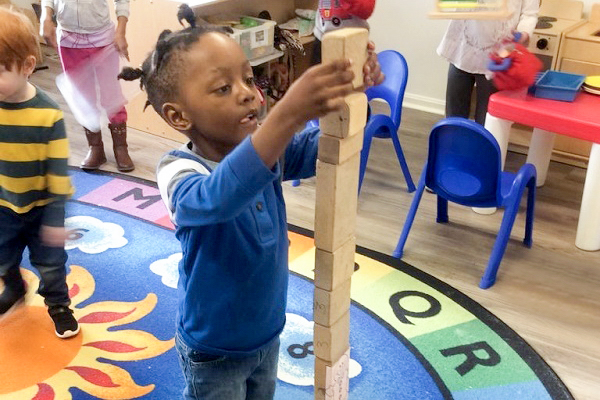
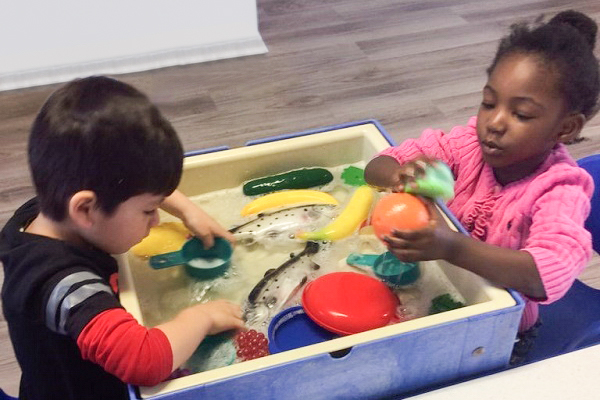
Promotes Abstract Thinking
The ability for your child to use a block as a phone, is a high-level thinking skill. Eventually, your child will recognize that numbers represent quantities and that combinations of letters represent the words that they can speak, hear, and read.
Ways For You To Nurture the Imagination
Not enough pretend play at your house?
Consider creating a prop box or corner filled with objects to spark your preschooler’s fantasy world.
You might include:
- Large plastic crates, cardboard blocks, or a large, empty box for creating a "home"
- Old clothes, shoes, backpacks, hats
- Old telephones, phone books, magazines
- Cooking utensils, dishes, plastic food containers, table napkins, silk flowers
- Stuffed animals and dolls of all sizes
- Fabric pieces, blankets, or old sheets for making costumes or a fort
- Theme-appropriate materials such as postcards, old plane tickets, foreign coins, and photos for a pretend vacation trip
- Writing materials for taking phone messages, leaving notes, and making shopping lists
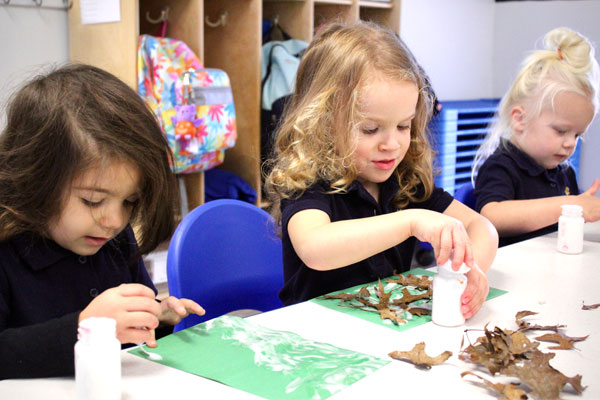
what our parents are saying...
Our Accreditations and Certifications


